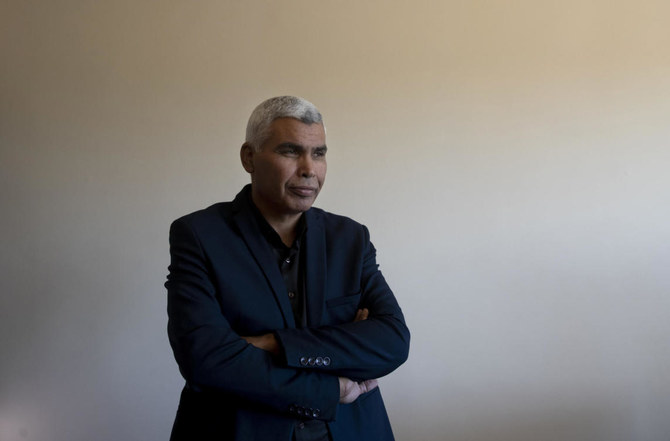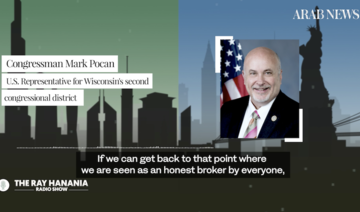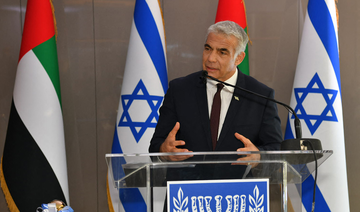JERUSALEM: In the weeks before his Arab party made history in Israel by joining the ruling coalition, Saeed Alkhrumi says his relatives and neighbors were notified that their homes would be demolished.
It was a stark illustration of the challenge ahead for the United Arab List, a small Islamist party that played a key role in forming Israel’s fragile new government and now hopes to secure gains for the Arab minority, including the impoverished Bedouin community in the south.
Alkhrumi, 49, hails from the Bedouin heartland in the Negev Desert, where tens of thousands of people live in unrecognized villages that are largely cut off from basic services and where homes and other structures have been built without legal permits, putting them at risk of demolition by Israeli authorities.
In recent years, Israel has sought to relocate the Bedouin to established towns, saying it would allow the state to provide modern services and improve their quality of life. The Bedouin view such efforts as a way of uprooting them from their ancestral lands, disrupting their traditional way of life and confining them to impoverished, crime-ridden communities.
Israeli plans to establish new communities catering to Jews on lands from which the Bedouin are being evicted have led many to fear Israel is replicating its settlement activities in the occupied territories, with the aim of displacing the Bedouin and changing the region’s demographics.
Alkhrumi has spent years negotiating with the government to recognize some of the Bedouin villages but says such efforts were repeatedly stymied during Prime Minister Benjamin Netanyahu’s 12-year reign, when right-wing parties dominated the state and its bureaucracy.
The Negev Coexistence Forum for Civil Equality, a rights group that closely tracks demolitions, says they spiked from 697 in 2013 to 2,586 last year, when the country was coping with the coronavirus pandemic.
“When Netanyahu came to power he increased the number of demolitions by a factor of 10,” Alkhrumi said. “Only a country in a state of war would demolish as many homes as are demolished in the Negev.”
He says his own relatives were given demolition orders in the weeks before the new government was approved by parliament and sworn in on June 13. He abstained for “private reasons,” he said, but his party provided the crucial margin in the 60-59 vote.
Alkhrumi says the new government is on track to eventually recognize eight villages, which would remove the threat of demolition and give them access to services.
“The extreme right realized these eight villages would be recognized, or maybe even more, that there would be progress and solutions for people, and they didn’t want it,” he said. “They issued hundreds of demolition orders in two weeks and they launched a media campaign against me.”
Now that the UAL has made history by becoming the first Arab party to join a governing coalition, Alkhrumi hopes to continue the negotiations and work with other parties to improve conditions in the south.
“I want the Arab Bedouin of the Negev to choose their way of life,” he said. “Those who want to live a traditional, agricultural life as Bedouin should have the opportunity to do so on their own land. What’s the problem?“
Regavim, a right-wing group that describes itself as committed to a “Zionist vision,” says the Bedouin can’t expect the government to provide services to “illegal squatters’ camps” established without any central planning.
“The state of Israel wants to give them all of the benefits of living in a modern Western society. The only way to do that is to collect people in some way,” said Naomi Kahn, head of the group’s international division. “You can’t both expect the state to give you all of the services that it provides and refuse to obey any of the rules of the state.”
The UAL is also hoping to use its political leverage to assist Israel’s non-Bedouin Arab minority, by securing larger budgets for housing, infrastructure and law enforcement, and by resisting or rolling back discriminatory legislation.
The Arab community, including the Bedouin, makes up 20 percent of Israel’s population. They have citizenship, including the right to vote, but face widespread discrimination. They have close familial ties to the Palestinians in the Israeli-occupied West Bank and Gaza, and largely identify with their cause, leading many Israelis to view them with suspicion.
Alkhrumi has no illusions about the challenge his party faces. The coalition includes eight parties from across the political spectrum. Three right-wing parties joined out of desperation to oust Netanyahu and avoid another election after four votes in less than two years.
“It’s an experiment,” Alkhrumi said. “Can we influence the government to benefit our society and exploit the political conditions that exist, or do we keep to ourselves. The easiest thing is to stay back and say I won’t get involved.
Then we have elections, and maybe the right comes back and we get Netanyahu again.”


























